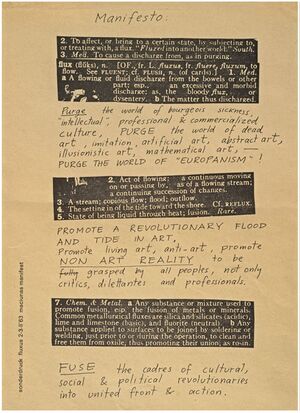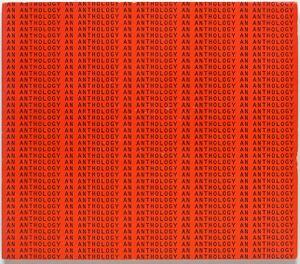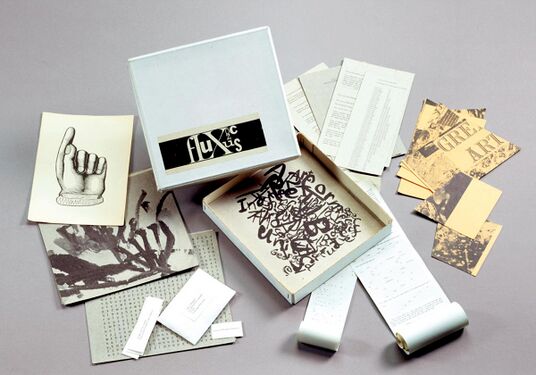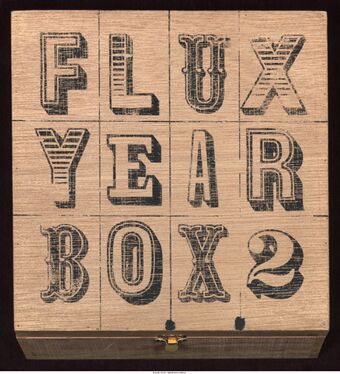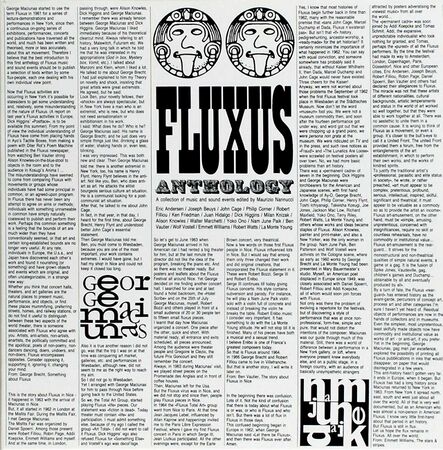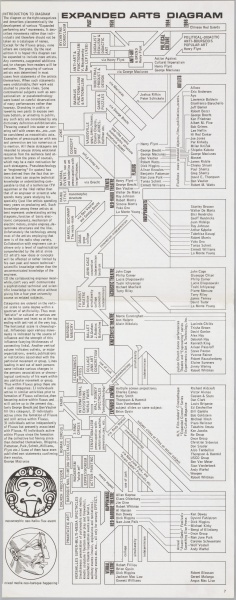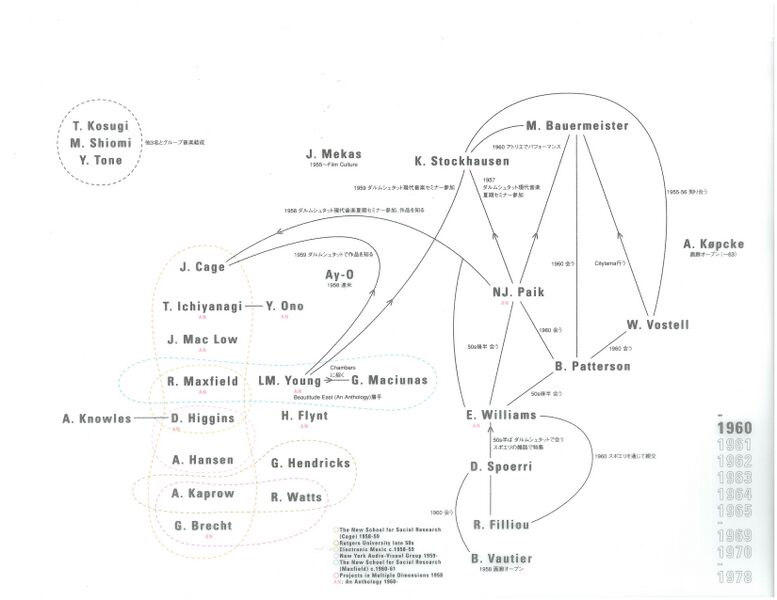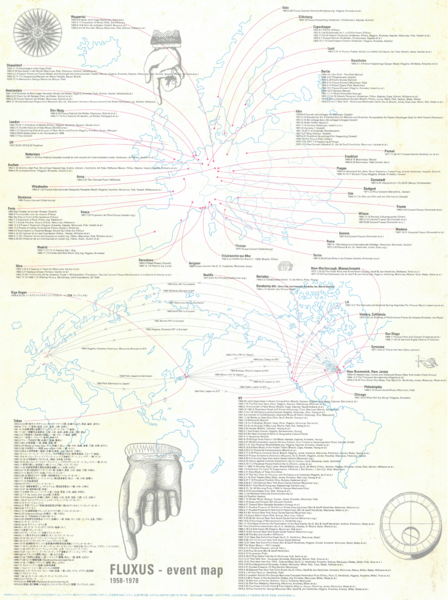Fluxus
Jump to navigation
Jump to search


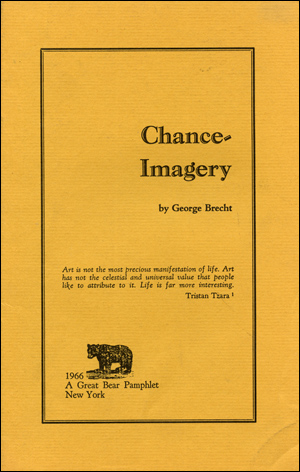
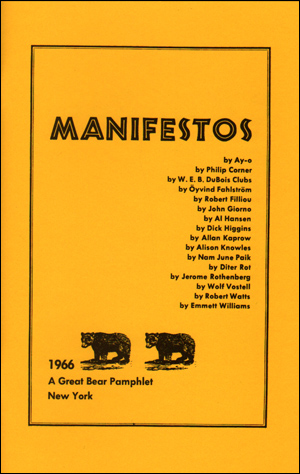
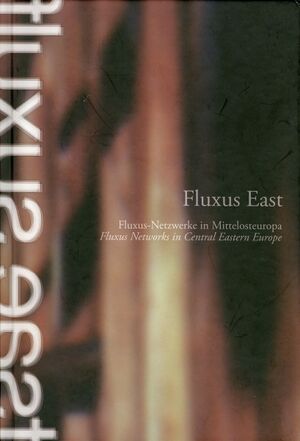

Nam June Paik, Alison Knowles, Emmett Williams, George Maciunas and Ben Patterson (L-R) performing George Maciunas's In Memoriam to Adriano Olivetti during Concert No. 5, Fluxus, at the Internationale Festspiele Neuester Musik, Städtisches Museum, Wiesbaden, 8 September 1962. Source.

Shigeko Kubota, Alison Knowles, Mieko Shiomi, Yoko Ono, Carolee Schneemann, and Sara Seagull (L-R), at the Fluxus exhibition Ubi Fluxus ibi motus during the 1990 Venice Biennale, with director Achille Bonito Oliva in the background. Photo: Larry Miller. Source.
Contents
Artists[edit]
- Eric Andersen
- Artpool
- Lenora de Barros
- Mary Bauermeister
- Joseph Beuys
- George Brecht
- John Cage
- Giuseppe Chiari
- Sari Dienes
- Édition Lebeer Hossmann
- Esther Ferrer
- Nye Ffarrabas
- Robert Filliou
- Albert M. Fine
- Michael Gibbs
- Ken Friedman
- Galeria Akumulatory 2
- Dick Higgins
- Dorothy Iannone
- Milan Knížák
- Alison Knowles
- Arthur Köpcke
- Takehisa Kosugi
- Shigeko Kubota
- George Maciunas
- Charlotte Moorman
- Ann Noël
- Yoko Ono
- Nam June Paik
- Benjamin Patterson
- Willem de Ridder
- Takako Saito
- Carolee Schneemann
- Mieko Shiomi
- Daniel Spoerri
- Yasunao Tone
- Endre Tót
- Ben Vautier
- Wolf Vostell
- Branko Vučićević
- Emmett Williams
- Zaj

Chance-Imagery, 1966, PDF.

Manifestos, 1966/2004, PDF.
Works[edit]
Objects, artists' publications[edit]
- George Brecht, Water Yam, c.1963.
- George Maciunas (ed.), Fluxus 1, 1964-1979, JPGs (book version), JPGs (box version). First of three issues of Maciunas' serialised publication. [1]
- George Maciunas, Name Cards, 1964, JPGs.
- Yoko Ono, Grapefruit: A Book of Instructions and Drawings by Yoko Ono, Tokyo: Wunternaum Press, 1964; 2nd ed., intro. John Lennon, Simon & Schuster, 1970.
- Fluxkit, 1965. [2]
- George Maciunas (ed.), Flux Year Box 2, New York, 1966-68, JPGs. Second of three issues of Maciunas' serialised publication. [3]
- Ben Vautier, Fluxbox Containing God, c1966.
- George Maciunas (ed.), Fluxtattoos, New York: Implosions, 1967.
- Daniel Spoerri, Roland Topor, Robert Filliou, Monsters are Inoffensive, 1968. Postcard set. [4]
- George Maciunas (ed.), Fluxpack 3, Flash Art Edizioni, 1973-75. Third of three issues of Maciunas' serialised publication.
Resources with digital editions[edit]
- Fluxus works in Fluxus Digital Collection, University of Iowa Libraries, [5]
- Fluxus West Digital Collection, Iowa Digital Library
Scores[edit]
- An Anthology of Chance Operations, ed. La Monte Young, New York: La Monte Young and Jackson Mac Low, Spring 1963; 2nd ed., New York: H. Friedrich, 1970, JPGs. First and only issue. Compilation of texts, scores for events, instruction cards, experimental poetry, and much more by artists musicians, poets, and dancers, who founded Fluxus, minimalism, conceptual art, and other experimental practices. Among the artists included are George Brecht, John Cage, Walter De Maria, Henry Flynt, Yoko Ono, Dick Higgins, Toshi Ichiyanagi, Ray Johnson, Simone Forti, Nam June Paik, Terry Riley, Diter Rot, Emmett Williams, and Christian Wolff.
- Alison Knowles, By Alison Knowles, Great Bear Pamphlets, New York: Something Else Press, 1965; UbuClassics, 2004, PDF. [6]
- Bengt af Klintberg, The Cursive Scandinavian Salve, A Great Bear Pamphlet, New York: Something Else Press, 1967; UbuClassics, 2004, PDF.
- Women's Work, eds. Alison Knowles and Annea Lockwood, New York: Alison Knowles and Anna Lockwood, 1975. [7]
- Scenarios: Scripts to Perform, ed. Richard Kostelanetz, Brooklyn, NY: Assembling Press, 1980, 704 pp.
- The Fluxus Performance Workbook, eds. Ina Blom and Ken Friedman, Trondheim: El Djarida, 1990, 63 pp; new ed., eds. Ken Friedman, Owen Smith, and Lauren Sawchyn, Performance Research, 2002, 117 pp. [11]
- Fluxus Scores and Instructions: The Transformative Years. Selections from The Gilbert and Lila Silverman Fluxus Collection, Detroit, eds. Jon Hendricks, with Marianne Bech and Media Farzin, Roskilde: Museum of Contemporary Art, 2008, 230 pp.
- "Antologia. Scritti, proposte e partiture di (Fluxus)", in Women in Fluxus & Other Experimental Tales: Eventi Partitures Performance, ed. Elena Zanichelli, Milan: Skira, 2012, pp 141-220. (Italian),(English)
Writings[edit]
- George Maciunas, Fluxus Manifesto, Feb 1963. Distributed during Festum Fluxorum Fluxus, Düsseldorf. Other Fluxus manifestos.
- Happenings: Fluxus, Pop Art, Nouveau Realisme: Eine Dokumentation, eds. Jürgen Becker and Wolf Vostell, Rheinbeck: Rowohlt, 1965, 470 pp. Historical resource for the original interconnection among these four overlapping, once mutually enhancing, artistic movements, aesthetic concerns that have subsequently been pried apart in the history of art.
- Film Culture 43: "Expanded Arts", ed. Jonas Mekas, New York: Film Culture, Winter 1966, 12 pp.
- Henry Flynt, Down With Art, New York: Fluxpress, 1968, [12] pp.
- Wolf Vostell, Miss Vietnam, San Francisco: Nova Broadcast Press, 1969, 37 pp.
- Robert Filliou, et al., Teaching and Learning as Performing Arts / Lehren und Lernen als Auffuehrungskuenste, Cologne and New York: König, 1970, 236 pp. (English)/(German)
- Robert Filliou, George Brecht, "The Eternal Network", pp 198-207, PDF.
- Enseigner et apprendre, arts vivants, trans. Juliane Regler and Christine Fondecave, Paris and Brussels: Archives Lebeer Hossmann, 1998, 261 pp. (French)
- Alison Knowles, Journal of the Identical Lunch, San Francisco: Nova Broadcast Press, 1971. [12]
- Fluxus: izbor tekstova, ed. Aleksandra Janković, Belgrade: Muzej savremene umetnosti, 1986, [96] pp. (Serbo-Croatian)
- WhiteWalls: A Magazine of Writings by Artists 16: "Fluxus", ed. Ken Friedman, Spring 1987, 128 pp. [13]
- Intermedia, Fluxus, and the Something Else Press. Selected Writings by Dick Higgins, eds. Steve Clay and Ken Friedman, Catskill, NY: Siglio, 2018, 364 pp. Publisher. [14]. Reviews: Gibbons (Hyperallergic), Harren (Artforum), Ox (Leonardo), Waldow (Brooklyn Rail), Galbreth (Glasstire), Kirkus.
- We Are in Open Circuits. Writings by Nam June Paik, eds. John G. Hanhardt, Gregory Zinman, and Edith Decker-Phillips, MIT Press, 2019, 445 pp. Publisher.
- Periodicals, newsletters
- décoll/age: Bulletin aktueller Ideen und Kunst nach, ed. Wolf Vostell, Cologne, 1962-69. [15] (German)
- News-Policy-Letter, 7 numbers, ed. George Maciunas, Wiesbaden: Fluxus (1-4), Ehlhalten: Fluxus (5-7), 1962-63.
- Aktuální umění, 2 issues, ed. Aktuální umění, Prague, 1964-65. (Czech)
- Fluxnewsletter, ed. George Maciunas, New York, 1965-76. Selection.
- Something Else Press Newsletters, 22 numbers, ed. Dick Higgins, New York: Something Else Press, 1966-73 & 1983.
- Something Else Press (incl. Great Bear Pamphlets) [16]
Selection according to Friedman & Owen's Fluxus bibliography.
- Dick Higgins, Jefferson’s Birthday / Postface, 2 vols., New York: Something Else Press, 1964, 271+89 pp. [17] [18] [19]
- Benjamin Patterson, Alison Knowles, Philip Corner, Tomas Schmit, The Four Suits, New York: Something Else Press, 1965, 192 pp. [20] [21]
- Robert Filliou, Ample Food for Stupid Thought, New York: Something Else Press, 1965.
- Al Hansen, A Primer of Happenings and Time/Space Art, New York: Something Else Press, 1965, 145 pp.
- Ray Johnson, The Paper Snake, New York: Something Else Press, 1965.
- Alison Knowles, By Alison Knowles, Great Bear Pamphlets, New York: Something Else Press, 1965; UbuClassics, 2004, PDF. [22]
- George Brecht, Chance-Imagery, Great Bear Pamphlets, New York: Something Else Press, 1966, 16 pp; UbuClassics, 2004, PDF.
- Manifestos, Great Bear Pamphlets, New York: Something Else Press, 1966; UbuClassics, 2004, PDF; repr., Brooklyn, NY: Primary Information, 2007. [23]
- Jackson Mac Low, The Twin Plays, Great Bear Pamphlets, New York: Something Else Press, 1966; UbuClassics, 2004, PDF.
- Daniel Spoerri with Robert Filliou, An Anecdoted Topography of Chance, trans. & annot. Emmett Williams, ills. Topor, New York: Something Else Press, 1966, xviii+214 pp; exp.ed., London: Atlas Press, 1995, 236 pp; new ed., London: Atlas Press, 2016, 271 pp.
- Topographie anecdotée du hasard, Paris: Galerie Lawrence, 1962, 53 pp; repr., facs., Paris: Centre Georges Pompidou, 1990, 53 pp; exp.ed., Paris: Othello, 2016, 370+[16] pp. (French)
- Anekdoten zu einer Topographie des Zufalls, Neuwied; Berlin: Luchterhand, 1968, 162 pp. (German)
- Wolf Vostell, Berlin and Phenomena, trans. Laura P. Williams, Great Bear Pamphlets, New York: Something Else Press, 1966, 16 pp; UbuClassics, 2004, PDF.
- George Brecht, Robert Filliou, Games at the Cedilla, or the Cedilla Takes Off, New York: Something Else Press, 1967. [24] [25]
- Robert Filliou, A Filliou Sampler, Great Bear Pamphlets, New York: Something Else Press, 1967, 16 pp; UbuClassics, 2004, PDF.
- Juan Hidalgo, A Zaj Sampler, trans. Peter Besas, Great Bear Pamphlets, New York: Something Else Press, 1967; UbuClassics, 2004, PDF.
- Bengt af Klintberg, The Cursive Scandinavian Slave, A Great Bear Pamphlet, New York: Something Else Press, 1967; UbuClassics, 2004, PDF.
- Emmett Williams (ed.), An Anthology of Concrete Poetry, New York: Something Else Press, and Stuttgart: hansjörg mayer, 1967; repr., New York: Primary Information, 2013, 342 pp.
- Dick Higgins, foew&ombwhnw: A Grammar of the Mind and a Phenomenology of Love and a Science of the Arts As Seen by a Stalker of the Wild Mushroom, New York: Something Else Press, 1969, 320 pp.
- Jackson Mac Low, Stanzas for Iris Lezak, Barton, VT: Something Else Press, 1971.
- Wolf Vostell, Dick Higgins (eds.), Fantastic Architecture, New York: Something Else Press, 1971.
- Richard Kostelanetz (ed.), Breakthrough Fictioneers, Barton, VT and Berlin: Something Else Press, 1972, 360 pp.
- Geoff Hendricks, Ring Piece, Barton, VT: Something Else Press, 1973.
Film, video[edit]
- Fluxfilm Anthology, 1962-1970. Compiled by George Maciunas.
- Fluxus video at Fondazione Bonotto
Sound[edit]
FluxTellus, 1990, MP3s
- Fluxus Anthology: A Collection of Music and Sound Events, ed. Maurizio Narrucci, Florence: Zona archives & Recorthings, 1989, vinyl; Florence: Anthology Records, 1995, CD, MP3s.
- Tellus 24: FluxTellus, ed. Barbara Moore, Harvestworks, NY: Tellus, 1990, cassette. [26]
- Fluxus Anthology, 30th Anniversary 1962-1992, ed. Jan Van Toorn, Holland: Slowscan Editions, 1993, MP3s.
- Crayon: Festschrift for Jackson Mac Low's 75th Birthday, eds. Andrew Levy and Bob Harrison, New York, 1997.
- Fluxus Anthology, Slowscan Editions, 2004, 2 LPs.
- Fluxus Anthology, ed. Walter Cianciusi, mIEKAL aND, 2006. A collection of music and sound events assembled for Fluxlist.
- Fluxus Anthology – 60 Year Anthology 1962-2022, 's-Hertogenbosch: Slowscan, 2022/2023, 10 audio cassettes. [27]
- Fluxus audio works at Fondazione Bonotto
Graphic design[edit]
Chronologies, diagrams[edit]
- George Maciunas (ed.), International Fluxus Festivals and Concerts, 1965. Collection of flyers and posters, 1962-65.
- George Maciunas, "Fluxus (Its Historical Development and Relationship to Avant-garde Movements)", 1966. [28]
- George Maciunas, "Expanded Arts Diagram", Film Culture 43: "Expanded Arts", ed. Jonas Mekas, New York, Winter 1966, p 7, PDF. [29]
- Ken Friedman, Chronology of Fluxus West, 1966-1970, 1970, 9 pp.
- George Maciunas, Diagram of Historical Development of Fluxus and Other 4 Dimentional, Aural, Optic, Olfactory, Epithelial and Tactile Art Forms, annot. Alison Knowles, 1973. [30] [31] [32]
- "Fluxus Chronology: Key Moments and Events", in The Fluxus Reader, ed. Ken Friedman, Academy Editions, 1998, pp 257-282.
- "Chronology", in Fluxus–Art into Life, 2004, PDF.
- "Fluxus Event Map, 1958-1978", in Fluxus–Art into Life, 2004, PDF.
Catalogues[edit]

Fluxus East: Fluxus Networks in Central Eastern Europe, 2007, PDF. (DE/EN)
For the catalogues of solo exhibitions, see the pages of the respective artists.
- Symposium on the Avant-Garde, 1964, [5] pp.
- Pictures to be Read, Poetry to be Seen, Chicago: Museum of Contemporary Art, 1967, 33 pp. Exh. curated by Jan van der Marck; held at MCA Chicago, 24 Oct-3 Dec 1967.
- Happening & Fluxus: Materialien, ed. Hans Sohm, Cologne: Kölnischer Kunstverein, 1970, [340] pp. Exh. curated by Hans Sohm and Harald Szeemann; held at the Kölnischer Kunstverein, Cologne, 6 Nov 1970-6 Jan 1971. [33] (German)
- Fluxus: The Most Radical and Experimental Art Movement of the Sixties, ed. Harry Ruhé, Amsterdam: A, 1979. In 1979, this publication was the most comprehensive history of Fluxus activities, editions, and general Fluxus literature, with an essay on the history of Fluxus by Ruhé. Useful as an early inclusive history of Fluxus compared to the increasingly less comprehensive canonized versions of Fluxus. Loose-leaf alphabetized artists’ pages with biographies, lists of works, publications, and many photographs assembled in a three-ring binder. Exh. held at A, Amsterdam, Jan 1976.
- Actie, werkelijkheid en fictie in de kunst van de jaren '60 in Nederland, ed. W.A.L. Beeren, 's-Gravenhage: Staatsuitgeverij, 1979, 176 pp, PDF. Exh. held at Museum Boymans van Beuningen, Rotterdam, 9 Nov 1979-6 Jan 1980. (Dutch)
- 1962 Wiesbaden FLUXUS 1982, ed. Rene Block and Anne Marie Freybourg, Wiesbaden: Harlekin Art, 1982.
- Fluxus etc.: The Gilbert and Lila Silverman Collection, ed. Jon Hendricks, Bloomfield Hills, MI: Cranbrook Academy of Art Museum, and Detroit, MI: Gilbert and Lila Silverman Fluxus Collection, 1981, 410 pp. [34]. Addenda I, 1983, 299 pp. [35]. Addenda II, 1983, 439 pp. [36]
- Fluxus: izbor tekstova, ed. Aleksandra Janković, Belgrade: Muzej savremene umetnosti, 1986, [96] pp. (Serbo-Croatian)
- Fluxus: 25 Years (1962-1987), ed. Dick Higgins, Williamstown, MA: Williams College Museum of Art, 1988.
- Clive Phillpot, Jon Hendricks, Fluxus: Selections from the Gilbert and Lila Silverman Collection, New York: Museum of Modern Art, 1988, 64 pp. [37]
- Extended Play, eds. Ursula Block and Christian Marclay, New York: Emily Harvey Gallery, 1988, [53] pp. With an audio disc (33 1/3 rpm). (English)
- Fluxus a del "principio d'indeterminazione", Genova: Centre Culturel Franco-Italien Galliera, 1988, 77 pp. Essay by Enrico Pedrini. (Italian)
- Arthur Køpcke Arkivet, Aarhus: Aarhus Kunstmuseum, 1989, 60 pp. (Danish)
- Happenings & Fluxus, ed. Charles Dreyfus, Paris: Galerie 1900-2000, 1989.
- Ubi Fluxus ibi motus, 1990-1962, ed. Achille Bonito Oliva, Milan: Mazzotta, and Venice: La Biennale di Venezia, 1990, 498 pp. Exh. held as part of Venice Biennale 1990.
- Fluxus! An Exhibition of Textile-Art Multiples, Editions Francesco Conz, 1990, 37 pp. Exh. held at the Institute of Modern Art, Brisbane, 14 Jun-7 Jul 1990; curated by Nicholas Zurbrugg, Francesco Conz, and Nicholas Tsoutas.
- Fluxus Subjektiv, ed. Ursula Krinzinger, Vienna: Galerie Kinzinger, 1990.
- Fluxus S. P. Q. R., ed. Sarenco, Rome: Galleria Fontanella Borghese, 1990.
- Fluxartisti, ed. Cristina Morato, Verona: Galleria La Giarina, 1991.
- Under the Influence of Fluxus: An Exhibition of Printed Textile Multiples, ed. Wayne Baerwaldt, Winnipeg: Plug In Inc., 1991, 63 pp. [38]
- Fluxus: A Conceptual Country, ed. Estera Milman, Jan 1992, 248 pp, PDFs. Special issue of Visible Language 26(1-2).
- Fluxus Virus, 1962-1992, ed. Ken Friedman, Cologne: Galerie Schüppenhauer, 1992, 399 pp. Includes 41 artists and biographies, with essays exploring the identity of Fluxus by Peter Frank, Ina Conzen Meairs, Wilfried Dörstel and Reiner Steinberg, Hannah Higgins, Karen Moss, Owen F. Smith, David T. Doris, Dieter Daniels, Ina Blom, Mariane Hoffmann, Michael Erlhoff, James Lewes, Manfred de la Motte, and Ken Friedman. [39] [40] (German)/(English)
- Fluxus aus der Sammlung Andersch, ed. Bielefelder Kunstverein with Erik Andersch, Andreas Beaugrand and Friedemann Malsch, Bielefeld: Pendragon, 1992, 171 pp. (German)
- Fluxus da capo: 1962 Wiesbaden 1992, ed. René Block, Wiesbaden: Nassauischer Kunstverein, 1992, 175 pp. (German)
- Fluxus: The Development of an Antidote, ed. Mats B., Stockholm: Galleri Stenstrom, 1992, [22] pp. Exh. held 29 Oct 1992-17 Jan 1993.
- In the Spirit of Fluxus, eds. Elizabeth Armstrong, Janet Jenkins, and Joan Rothfuss, Minneapolis, MN: Walker Art Center, 1993, 192 pp. Stiles' essay. Texts by Andreas Huyssen, Simon Anderson, Kristine Stiles, Owen Smith, Douglas Kahn, Bruce Jenkins, and Elizabeth Armstrong. Review: Ivacs (Artpool). [41]
- Fluxus and After..., South Brisbane: Queensland Art Gallery, 1993, 46 pp. Exh. held 23 Dec 1993-13 Feb 1994.
- Adrian Glew, Jon Hendricks, Fluxbritannica: Aspects of the Fluxus Movement 1962-73, London: Tate Gallery, 1994.
- Fluxus. Eine lange Geschichte mit vielen Knoten. Fluxus in Deutschland 1962–1994, 2 vols., eds. René Block and Gabriele Knapstein, Stuttgart: Institut für Auslandsbeziehungen, 1995, 100+266 pp. (German)
- Dlouhý příběh s mnoha uzly. Fluxus v Německu 1962-1994: texty, trans. Jiří Strážnický and Jan Mattuš, Stuttgart: Institut pro zahraniční vztahy, 1995, 73 pp. (Czech)
- In de geest van Fluxus, Antwerp: Stadsdrukkerij, 1995, 85 pp. [42] (Dutch)
- Fluxus nel Veneto. Fluxus: una storia veneta, Colognola ai Colli: Adriano Parise, 1995. Exh. held at the Museo Biblioteca Archivio, Bassano del Grappa. (Italian)/(English)
- Fluxus: definíciók és idézetek. Szöveggyűjtemény a Fluxus Németországban 1969-1994 című kiállításhoz, ed. László Beke, Budapest: Műcsarnok, 1996, 56 pp. (Hungarian)
- A Long Tale with Many Knots. Fluxus in Germany, 1962-1994, ed. René Block, Gabriele Knapstein, and Carola Bodenmüller, Stuttgart: Institut für Auslandsbeziehungen (ifa), 1997, 52 pp. (English)
- Alternative Traditions in the Contemporary Arts: Subjugated Knowledges and the Balance of Power, ed. Estera Milman, University of Iowa Museum of Art, 1999, 111 pp. With contributions by Ken Friedman, Stephen Perkins, and Owen Smith. Archived version.
- Off Limits: Rutgers University and the Avant-Garde, 1957–1963, ed. Joan Marter, New Jersey: Newark Museum and Rutgers University Press, 1999. Review: Beckman & Applefield (Art J). [43]
- Critical Mass: Happenings, Fluxus, Performance, Intermedia, and Rutgers University, 1957–1972, ed. Geoffrey Hendricks, New Brunswick, NJ: Rutgers University Press, 2003. [44] [45] [46] (English)
- Astrit Schmidt-Burkhardt, Maciunas' Learning Machines: From Art History to a Chronology of Fluxus, Berlin: Vice Versa, 2003; 2nd ed., rev. & exp., forew. Jon Hendricks, Vienna and New York: Springer, 2011, 215 pp. [47]
- O que é Fluxus? O que não é! O porquê / What's Fluxus? What's Not! Why, ed. Jon Hendricks, Rio de Janeiro: Centro Cultural Banco do Brasil, 2002, 272 pp. (Brazilian Portuguese)/(English)
- Fluxus und Freunde. Sammlung Maria und Walter Schnepel / Fluxus and Friends: The Maria and Walter Schnepel Collection, Bremen: Neues Museum Weserburg Bremen, 2002, 224 pp. (German)/(English)
- Intermedia: The Dick Higgins Collections at UMBC, ed. Lisa Moren, Baltimore: University of Maryland, 2003, 84 pp. (English)
- Fluxus—Art into Life, eds. Nobuko Akita, Yoko Hayami, and Midori Yoshimoto, Saitama, Japan: Urawa Bijutsukan, 2004. [48] (Japanese)/(English)
- Fluxus East: Fluxus-Netzwerke in Mittelosteuropa / Fluxus East: Fluxus Networks in Central Eastern Europe, ed. Petra Stegmann, Berlin: Kuenstlerhaus Bethanien, 2007, 288 pp. Exh. held in Berlin (Künstlerhaus Bethanien, 4 Sep-4 Nov 2007), Vilnius (Contemporary Art Centre), Cracow (Bunkier Sztuki), Budapest (Ludwig Múzeum), Tallinn (KUMU Art Museum), Copenhagen (Kunsthallen Nikolaj), Høvikodden/Oslo (Henie Onstad Art Centre). Contains artists' biographies, an extensive illustrated chronology divided in sections, including an “Overall Survey of Fluxus Events in Central Eastern Europe (1962–1989), “Fluxus Concerts,” “Individual Exhibitions and Performances,” “Exhibitions and Festivals,” “Mieko Shiomi’s ‘Spatial Poems,’” “Nine Global Events,” and “Fluxus East and West,” and essays by Eric Andersen, Andrea Bátorová, Milan Knížák, Pavlína Morganová, Luiza Nader, Maria Anna Potocka, Tamás St. Auby, Petra Stegmann, and Emmett Williams. [49] [50] (German)/(English)
- The Avant-Garde: From Futurism to Fluxus, Vilnius: Jonas Mekas Visual Arts Center, 2007, 286 pp. Exhibition.
- Fluxus Scores and Instructions: The Transformative Years. Selections from The Gilbert and Lila Silverman Fluxus Collection, Detroit, eds. Jon Hendricks, with Marianne Bech and Media Farzin, Roskilde: Museum of Contemporary Art, 2008, 230 pp.
- Fluxus in Holland. De jaren '60, eds. Jeannette Dekeukeleire and Harry Ruhé, Amsterdam: Galerie A / artKitchen, 2009. [51]
- Fluxus, ed. Caroline S. Ugelstad, Høvikodden: Henie Onstad Art Center, 2010, 267 pp. Catalogue of the Ken Friedman Fluxus Collection at the Henie Onstad Art Centre. [52]
- Fluxus and the Essential Questions of Life, ed. Jacquelynn Baas, Hanover, NH: Hood Museum of Art, and University of Chicago Press, 2011, 133 pp. Excerpt.
- Fluxus in Italia: testi documenti immagini, ed. Caterina Gualco, Genova: Il Canneto, 2012, 373 pp. (Italian)/(English)
- Fluxus at 50, eds. Alexander Klar, Stefan Fricke, and Sarah Maske, Bielefeld: Kerber, 2012. [53]
- Fluxus! Antikunst ist auch Kunst, eds. Werner Esser, Bettina Kunz, and Steffen Egle, Stuttgart: Staatsgalerie Stuttgart, 2012, 154 pp. (German)
- Fluxus: Una rivoluzione creativa / A Creative Revolution, 1962-2012, eds. Antonio d'Avossa and Nicoletta Ossanna Cavadini, Milan: Skira, 2012, 367 pp. (Italian)/(English)
- Women in Fluxus & Other Experimental Tales: Eventi Partitures Performance, ed. Elena Zanichelli, Milan: Skira, 2012, 220 pp. (Italian)
- Fluxus Black&White, Belo Horizonte: Oi Futuro, 2012, 121 pp. [54] (English)/(Brazilian Portuguese)
- "The Lunatics are on the Loose...": European Fluxus Festivals, 1962-1977, ed. Petra Stegmann, Potsdam: Down With Art!, 2012, 591 pp. Extensive documentation of 32 selected European Fluxus events in Aachen, Aberystwyth, Amsterdam, Berlin, Budapest, Copenhagen, Düsseldorf, London, Madrid, Nizza, Oslo, Paris, Prague, Poznan, Rotterdam, Scheveningen, Stockholm, Vilnius, Wiesbaden, Wuppertal. [55] [56] (English)
- Fiat Flux: La nébuleuse Fluxus, 1962-1978 / The Fluxus Nebula, 1962-1978, Milan: Silvana, and Saint-Étienne: Musée d'art moderne, 2012, 287 pp. Exh. held at the Musée d'art moderne, Saint-Étienne, 27 Oct 2012-27 Jan 2013, and Galleria Civica, Modena, 16 Feb-2 Jun 2013. (French)/(English)
- Living Collections Catalogue, 2: Art Expanded, 1958-1978, ed. Eric Crosby, Minneapolis: Walker Art Center, 2015.
- Fluxbooks: Fluxus Artist Books from the Luigi Bonotto Collection. From the Sixties to the Future, eds. Giorgio Maffei and Patrizio Peterlini, Milan: Mousse, 2015, 294 pp. (English)/(Italian)
- Revisions: Zen for Film, ed. Hanna B. Hölling, New York City: Bard Graduate Center, 2015, 100 pp.
- Sense Sound/Sound Sense: Fluxus Music, Scores & Records in the Luigi Bonotto Collection, eds. Patrizio Peterlini and Walter Rovere, Ravenna: Danilo Montanari, 2016, 216 pp. Exh. held at the Auditorium Parco della musica, Rome, Italy, 6 May-2 Jun 2016. [57] [58]
- Call it Something Else: Something Else Press, Inc. (1963-1974), Madrid: Museo Nacional Centro de Arte Reina Sofía, 2023, 260 pp. Exhibition.
- Llámalo de otra manera. Something Else Press, Inc. (1963-1974), Madrid: Museo Nacional Centro de Arte Reina Sofía, 2023, 276 pp. (Spanish)
- Resources
- Fluxus catalogues at Fondazione Bonotto
Collections and archives[edit]
- Public
- Alternative Traditions in the Contemporary Arts (ATCA), University of Iowa; Iowa City, US. Serving as an interface among University of Iowa facilities (the Museum of Art, the University Libraries, and a number of academic units) Alternative Traditions in the Contemporary Arts (ATCA) Project is committed to the collection and preservation of works and papers of contemporary artists and to the facilitation and dissemination of research related to the post-World War II avant-garde. ATCA hosts various individual collections related to Fluxus artists and practices: The Fluxus West Collection, The Ken Friedman ATCA Collection, The Alice Hutchins Papers, Jonas Mekas Collection of Fluxus Films and Artifacts of the Eternal Network Papers. See also: Fluxus Digital Collection at Digital Studio for Public Arts & Humanities, featuring works from the UI Special Collections donated by artist and benefactor Ken Friedman.
- Archives of American Art, Smithsonian Institution; Washington DC, US. Archives host various collections with material related to Fluxus artists and Fluxus history. Most important are: Ted and Joan Wilentz collection of Fluxus-related materials (1963-1983), Dick Higgins papers (1958-1997) and Ken Friedman papers (1969-1978). The oral history collection includes interviews with Fluxus artists, including Alison Knowles, Geoffrey Hendricks, Benjamin Patterson and Al Hansen.
- Artists' Book Collection, California Institute of the Arts; Santa Clarita, CA, US. The collection hosts various multiples by Fluxus artists.
- Artists' Multiples Collection, Chelsea Collections and Archives; London, UK. Established in the 1980s, some of the items had been acquired during the previous two decades. This unique collection for a library is particularly strong on Fluxus and contemporary British artists.
- Archiv Sohm, Staatsgalerie Stuttgart; Stuttgart, Germany. Archive of Hanns Sohm (1921-1999), a dentist and a collector of intermedia art and counter-culture from the 1960s and 1970s including the Beat scene, the Happening, Fluxus, Viennese Actionism, Concrete Poetry, the multi-media works of Dieter Roth and Zero. PDF
- Barbara and Peter Moore Fluxus Collection, Harvard Art Museums; Cambridge, US. The collection features a range of Fluxus editions and multiples dating from the early 1960s through the late 1970s. It includes pieces by Yoko Ono, Ken Friedman, Shigeko Kubota, Nam June Paik, George Brecht, George Maciunas among many others, as well as examples of many key multiples, a number of unique and rare works, and prototypes or models for editions. Acquired in 2005.
- David Tudor Papers, Getty Research Institute; Los Angeles, US. The collection documents David Tudor's participation in the post-war experimental and avant-garde music scene and aspects of his personal life until his death in 1996. Includes contributions by Fluxus artists such as Yoko Ono, Philip Corner and George Brecht.
- Dick Higgins Collection, Albin O. Kuhn Library & Gallery, University of Maryland, Baltimore County; Catonsville, Maryland, US. Donated from Dick Higgins's studio in Barrytown, New York by Alison Knowles, the collection focuses on Higgins, Something Else Press, and the wider Fluxus movement. It includes works by over 70 individual Fluxus and other artists, exhibition materials, publications from Something Else Press, and publications from members of the greater Fluxus movement.
- Donación Fluxus Gino di Maggio, Museo Vostell Malpartida; Malpartida de Cáceres, Spain. The collection was donated to the museum by the Italian collector, editor and curator Gino di Maggio, director of the Mudima Foundation in Milan and a friend of many of the Fluxus artists. The collection consists of 250 works by 31 artists and includes pieces by George Maciunas, Eric Andersen, Ayo-O, Philip Corner, Willhelm de Ridder, Robert Fillou, Dick Higgins, Alison Knowles, Yoko Ono, Ben Patterson, Mieko Shiomi, Robert Watts, Ben Vautier and others.
- Fluxus Materials at The New York Public Library; New York, US. Material related to Fluxus is available in various collections including Ellsworth Snyder collection of Fluxus multiples and ephemera (1958-1987), The Artists Files and The Pamphlet Files within the Art & Architecture Collection. The Print Collection also houses the Spencer Collection which owns original works by Fluxus artists such as Flux Year Box 2 (1967).
- Fluxus-related archives and publications, Charles Deering McCormick Library of Special Collections, Northwestern University; Evanston, Illinois, US. Library collection hosts multiples by Fluxus artists including Fluxus 1 (1964), George Brecht's Water Yam (1963) and Games & Puzzles (1965), Flux timekit (1966) by Robert Watts as well as ephemera and publications about the movement.
- George Maciunas Memorial Collection, The Hood Museum of Art; Hanover, NH, US. The Collection was established by then museum director Jan van der Marck in 1978 to pay tribute to Maciunas who had died that year. The Hood's holdings, which now reach beyond that original collection, include works by various Fluxus artists such as Nam June Paik, Alison Knowles, Ben Vautier, Milan Knížák, Mieko (Chieko) Shiomi, Ken Friedman, Philip Corner and Maciunas himself.
- Heinrich Liman Fluxus Collections, Museum FLUXUS+; Potsdam, Germany. Conceived by Berlin entrepreneur and art collector Heinrich Liman, the museum opened in 2008. The collection hosts historical and contemporary works by various key Fluxus artists.
- Jean Brown Papers, Getty Research Institute; Los Angeles, US. A study collection of avant-garde materials accumulated by librarian and art collector Jean Brown. The collection documents the Dada and Surrealist art movements, Fluxus, mail art, and concrete poetry. Materials include letters, printed matter and ephemera, clippings, art objects, sound recordings, motion pictures, and video recordings. Brown maintained close friendships with many artists whose work she collected, including George Maciunas, Dick Higgins and Ken Friedman. She was a part of the international mail art network. The Getty Center acquired the collection from Jean Brown in 1988. Additional correspondence and notes were obtained from the family of Jean Brown in 2016. Publications received with the archive have been separated to the Getty Research Library.
- John Cage Collection, Northwestern University Music Library; Evanston, Il, US. In 1965, Cage sent letters to hundreds of composers, visual artists, and writers soliciting manuscripts for inclusion in a book to benefit the Foundation for Contemporary Performance Arts. Cage published selections as Notations (New York: Something Else Press, 1969). In addition to the music manuscripts, the Notations collection includes much of the correspondence generated around this project. On occasion, correspondence from figures such as Nam June Paik and George Brecht includes music that was not intended to be part of the project and was not included in the book.
- Mayor/Fluxshoe/Beau Geste Press (BGP) Archive, Tate; London, UK. The archive consists of material relating to three areas of life of artist and art historian David Mayor: the 'Fluxshoe' touring exhibition (1972-73); the records of the independent publishing house Beau Geste Press (1971-76); and Mayor's own papers (1968-82).
- Nam June Paik Art Center Collection and Archive, Nam June Paik Art Center; Yongin-si, Gyeonggi-do, Korea. Collection of artworks by Nam June Paik and other Fluxus artists including various multiples such as Name Kit (1965) by George Brecht, Events by Robert Watts (1964), Instruction No. 2 (1967) by Benjamin Patterson, Flux Rain Machine by Ay-O (1965) and photographic documentation of Festum Fluxorum Fluxus: Musik und Antimusik – Das Instrumentale Theater held at Staatliche Kunstakademie, Dusseldorf in 1963 by Manfred Leve. Nam June Paik Archives Collection includes various subcollections hosting material related to Fluxus artists such as Erik Andersch Collection, Mieko Shiomi Collection, Philip Corner Collection and Mary Bauermeister Collection.
- The Collection Hahn, MUMOK / Museum Moderner Kunst Stiftung Ludwig Wien; Wienna, AT. The Collection of Wolfgang Hahn, an art conservator from Cologne and head of the Museum Ludwig Cologne restoration workshops, focuses on nouveau réalisme, Fluxus, performance art, and works that take a critical look at institutions. The collection includes the Hahn Library, which was donated to the museum in 2005 by Hildegard Hahn, so that together collection and library present the entire complexity of art in the 1960s including the artists associated with Fluxus, such as George Brecht and Nam June Paik. The museum hosts also the Wolfgang Hahn Archive that consist of documentary materials like invitations, flyers, and cards, all associated with the artists in the Hahn Collection (e.g. Daniel Spoerri, Nam June Paik, Marcel Broodthaers).
- The Gilbert and Lila Silverman Fluxus Collection, The Museum of Modern Art; New York, US. The Silverman Collection was built and organized by scholar Jon Hendricks starting c. 1977, working with collectors Gilbert and Lila Silverman. It is the world's largest collection of artwork, documentation, and published materials related to Fluxus and particularly to its founder, George Maciunas. It was donated to MoMA in 2008 by the collectors. MoMA decided to split the Collection into three parts: works of art to the Department of Prints and Illustrated Books (currently Drawings and Prints), for their facility at handling editions; documentation to the Museum Archives, and publications to the Library.
- Sammlung Inge Baecker, Kunstmuseum Bochum. [59]
- The Museum Ostwall Collection, Dortmunder U - Center for Art and Creativity, Dortmund, Germany. The Museum Ostwall hosts three important collections related to Fluxus. The collectio of Wolfgang Feelisch, a collector from the city of Remscheid includes works by Joseph Beuys, Allan Kaprow and Robert Filliou. In 2010 the museum obtained works and documents on permanent loan from the estate of collector Hermann Braun (represented, since his death in 2009, by his heir Holger Lieff and since then mentioned in the literature as Sammlung Braun/Lieff) that includes works by Robert Watts, George Brecht and Dick Higgins. Since the early 90s the museum is a home to a part of the collection of Siegfried Cremer, a conservator, collector, artist and professor for painting techniques at the Düsseldorf Art Academy (1977-94). See: Grothe, Nicole. Fluxus - Kunst für alle! = Fluxus - art for everyone! Heidelberg: Kehrer, 2013. Print.
- Walker Fluxus Collection, The Walker Art Center; Minneapolis, US. Walker's Fluxus collection includes multiples and publications central to the history of the movement such as Fluxus 1 (1964), Flux Year Box 2 (1967), as well as multiples by Ben Vautier, George Brecht, Shigeko Kubota and others.
- Whitney Fluxus Collection, Whitney Museum of American Art; New York, US. Whitney's collection of Fluxus works comprises of iconic multiples from the 1960s such as George Brecht's Water Yam (1963/69) and Games & PuzzLes (1965/69), Ben Vautier's Holes (1963/69) and Shigeko Kubota's FLUX NAPKINS (1967).
- Private
- Archivio Conz; Berlin, Germany. The Italian collector, publisher, and photographer Francesco Conz (1935–2010) left behind an extensive art collection of works by artists associated with Lettrism, Viennese Actionism, Concrete Poetry, and Fluxus. Parts of the collection were sold in 2014 in Austria and in 2016 in Germany, excluding the holdings of works of Viennese Actionism. Based in Berlin since 2016, Archivio Conz's task is to research, restore, photograph, and catalogue the collection of over 4,000 works and make this accessible to the public in the form of publications, exhibitions, and events. See: An Interview with Francesco Conz.
- Emily Harvey Foundation; New York, US. The Foundation has a collection of over two thousand works of art acquired by Emily Kreis Harvey (1941-2004) during the operation of her gallery in New York from 1983 to 2004 or donated in her memory by the artists she represented. The collection holds works by Ayo-O, George Brecht, Robert Filliou, Al Hansen, Alison Knowles, La Monte Young, Nam June Paik, Carolee Schneemann, Daniel Spoerri and many others. It is an active collection: works are available for loan to museums and institutions around the world.
- Fondation du Doute (Foundation of Doubt); Blois, France. Founded in 2013 by Ben (Vautier) and Gino Di Maggio in collaboration with the Milan-based Mudima foundation, Caterina Gualco and numerous artists. Works by Fluxus artists (many on loan from the collection of Gino di Maggio) are on permanent display. See: Frèrot Christine. 2015. Fluxus in the Countryside: Fondation du Doute, Blois, France. ArtNexus 97, Jun - Aug 2015.
- Gino Di Maggio Collection, Fondazione Mudima; Milan, Italy. Gino Di Maggio (born in 1940), was an Italian collector, publisher and promotor of artists. In 1989 Di Maggio founded the non-profit Mudima Foundation in Milan, involved in the organisation of Ubi Fluxus ibi motus exhibition at the Venice Biennale in 1990.
- Hermann Braun Fluxus Collection; Remscheid, Germany. Hermann Brown started collecting Fluxus art in 1972. Over the years, he developed and maintained close friendships with George Brecht. Since his death in 2009 the collection is represented by his heir Holger Lieff and since then mentioned in the literature as Sammlung Braun/Lieff. Since 2010 part of the collection is on a permanent loan to Museum Ostwall in Dortmunder U. The collection includes among others unique objects by Fluxus artists, such as Alison Knowles's early paintings (see: Mari. 2017. Corporate Imaginations: Fluxus Strategies for Living. Oakland, CA: University of California Press).
- Luigi Bonotto Collection, Fondazione Bonotto; Colceresa, Italy. Founded by Luigi Bonotto, an Italian textile factory owner and an art collector, it focuses on Fluxus, Concrete, Visual, Sound, Performative and Electronic Poetry. It hosts works by most artists associated with Fluxus among them many iconic multiples such as Flux Year Box 1 (1964). Thanks to Bonotto's friendships with almost all the artists he collected, his collection became a repository of much of the material coming directly from the personal archives of the artists: drafts for published and unpublished books and catalogues, exhibition brochures, invitations, posters and correspondence. The digitised collection is available online.
- René Block Collection and Archive; Berlin, Germany. René Block is a gallery owner, art publisher collector and curator. His collection is considered to be one of the most important collections of works by Fluxus artists. Parts of the collection are on loan to the Neues Museum in Nürnberg (see: Ruttimann, Sylvia, and Karin Seinsoth. 2014. René Block interviewed by Sylvia Ruttimann and Karin Seinsoth. Oncurating.org: 73–78.)
- The Henie Onstad Fluxus Collection, Henie Onstad Kunstsenter. Høvikodden, Norway. Established at the end of the 1980’s in collaboration with Ken Friedman. Important parts of the Henie Onstad Fluxus Collection were donated in 2007 to the Art Center by Fluxus artist and professor Ken Friedman. The collection has been given the name Ken Friedman Fluxus Collection. Artists such as Geoffrey Hendricks, Nam June Paik and Al Hansen have also donated Fluxus works in relation to exhibitions at the Art Center (these are part of the main collection of Henie Onstad Kunstsenter). Henie Onstad Kunstsenter is also the owner of part of the Jean Brown Personal Papers collection, including the filing cabinet designed especially for Brown’s archive and the house in Tyringham in 1975 by Maciunas. The cabinet is on permanent display in the Avantgarde gallery at Henie Onstad Kunstsenter.
Exhibitions, events[edit]
Selection of gallery group exhibitions and festivals with an online presence. See Catalogues section above for more
- Festival of Fantastics, Roskilde, Denmark, 1985. Ten international artists all closely associated with Fluxus presented a series of events, performances, concerts and actions all over Roskilde and the surrounding area.
- Fluxus East: Fluxus Networks in Central Eastern Europe, Künstlerhaus Bethanien, Berlin, Sep-Nov 2007; Vilnius, 2007; Krakow, 2008; Budapest, 2008; Tallinn, 2008; Copenhagen, 2009; Henie Onstad Kunstsenter, Høvikodden/Oslo, Oct 2010-Feb 2011.
- Fluxus and the Essential Questions of Life, Grey Art Gallery, New York University, Sep-Dec 2011.
- Thing/Thought: Fluxus Editions, 1962-1978, MoMA, New York, 21 Sep 2011-16 Jan 2012. Review: Young (PAJ).
- Fluxus Weekend on Performa 11, New York, 11-13 Nov 2011. Review: Young (PAJ).
- Fluxus Sex Ties / Hier spielt die Musik!, Nassauischer Kunstverein Wiesbaden, 15 Jul 2022-8 Jan 2023. Exh. focusing on the women in Fluxus.
- Call It Something Else: Something Else Press, Inc. (1963-1974), Museo Nacional Centro de Arte Reina Sofía, Madrid, 27 Jan 2023-22 Jan 2024.
Literature[edit]
Art history and theory[edit]
For literature on individual artists, see their dedicated wiki pages.
- Books
- Thomas Kellein, Fluxus, London and New York: Thames and Hudson, 1995, 142 pp, IA.
- Ken Friedman (ed.), The Fluxus Reader, Academy Editions, 1998, 309 pp, ARG. Contains histories, theories, critical perspectives, and transcriptions from an interview with Maciunas by Larry Miller; an essay by Miller; and an interview with Billie Maciunas regarding her life with George Maciunas, and her encounters with Fluxus, by Susan L. Jarosi. Also includes an extensive chronology of events in Fluxus history, and a selected list of Fluxus art works and related primary and secondary source materials.
- Owen F. Smith, Fluxus: The History of an Attitude, San Diego, CA: San Diego State University Press, 1998, 336 pp, IA. Comprehensive survey of the birth, development, and cultural end (or “remnants”) of the Fluxus movement, elucidating the historical and philosophical complexities of the ethos of the movement and illustrating the enduring impact of Fluxus today. Chapter 1. [60]
- Hannah Higgins, Fluxus Experience, University of California Press, 2002, 259 pp. Based on her theory of aesthetic experience through the philosophical lens of the philosopher John Dewey, Higgins attends to experiential and phenomenological aspects of Fluxus, charts its history in the coincident context of happenings, conceptual, and pop art, discusses the reception of Fluxus, and offers a “Fluxus-Inspired Pedagogy”.
- Olivier Lussac, Happening & Fluxus: polyexpressivité et pratique concrète des arts, Paris: Harmattan, 2004, 297 pp, IA. (French)
- Midori Yoshimoto, Into Performance: Japanese Women Artists in New York, New Brunswick, NJ: Rutgers University Press, 2005, 248 pp. Case studies of the art of Yayoi Kusama, Yoko Ono, Takako Saito, Mieko Shiomi, and Shigeko Kubota, and their contribution to happenings and Fluxus. Reviews: Concannon (CAA), Chambers-Letson (Women & Performance), Teasley (Signs), Eglinton (Performance Paradigm).
- Shiomi Mieko, Furukusasu towa nanika: Nichijo to ato o musubitsuketa hitobito [What Is Fluxus? The People Who Connected Art and the Everyday], Tokyo: Firumuātosha, 2005. [61] (Japanese)
- Olivier Lussac, Fluxus et la musique, Dijon: Les Presses du reel, 2010, 332 pp. (French)
- Chris Thompson, Felt: Fluxus, Joseph Beuys, and the Dalai Lama, University of Minnesota Press, 2011, 319 pp.
- Natasha Lushetich, Fluxus: The Practice of Non-Duality, Amsterdam: Rodopi, 2014, xiv+274 pp. Review: Troshani (Leonardo).
- Lori Waxman, Keep Walking Intently: The Ambulatory Art of the Surrealists, the Situationist International, and Fluxus, Berlin: Sternberg, 2017, 285 pp. TOC. Publisher.
- Mari Dumett, Corporate Imaginations: Fluxus Strategies for Living, University of California Press, 2017, 400 pp. Based on 2009 PhD dissertation from Boston University. Publisher.
- Luciana Galliano, Japan Fluxus, Lanham, MD: Lexington Books, 2019, 176 pp. Publisher. Review: Mike Leggett (Leonardo).
- Harry Ruhé, Art, No-Art & Anti-Art: A Collection of Relics, Amsterdam: Galerie A, 2019, 157 pp. Publisher.
- Natilee Harren, Fluxus Forms: Scores, Multiples, and the Eternal Network, University of Chicago Press, 2020, 304 pp, ARG. Review: Chamberlain (CAA Reviews). Publisher. Video conversations: with Natilee Harren w/ Elizabeth Eager (2021), On Drawing: “Fluxus Forms” with Natilee Harren (2021), Ken Friedman w/ Natilee Harren (2022).
- Arzu Ozkal, Mila Waldeck (eds.), Cabaret Voltaire: Fluxus West, San Diego and Southern California Mail Art, San Diego, CA: San Diego State University Press, 2023, 350 pp. Publisher.
- Ursula Frohne, Rachael DeLue (eds.), Intermedia, Terra Foundation for American Art, 2023, 176 pp. With contributions by Anna Arabindan-Kesson, Eva Ehninger, Maggie Cao, Michelle Smiley, Natilee Harren, and Sebastian Egenhofer. Excerpt. Publisher. Distributor.
- Michael Gallope, Natilee Harren, John Hicks (eds.), The Scores Project: Essays on Experimental Notation in Music, Art, Poetry, and Dance, 1950-1975, Los Angeles: Getty Research Institute, 2025, 248 pp.
- Journal issues
- Art and Artists 79: "Free Fluxus Now!", London, Oct 1971.
- WhiteWalls: A Magazine of Writings by Artists 16: "Fluxus", ed. Ken Friedman, Spring 1987, 128 pp. [62]
- Kunstforum International 115: "Fluxus - Ein Nachruf zu Lebzeiten", ed. Dieter Daniels, Cologne, Sep-Oct 1991. (German)
- Performance Research 7(3): "On Fluxus", eds. Ken Friedman and Owen Smith, Routledge, Sep 2002, 142 pp.
- Visible Language 39(3): "Fluxus and Legacy", ed. Ken Friedman, Sep 2005, PDFs.
- Visible Language 40(1): "Fluxus After Fluxus", eds. Ken Friedman and Owen F. Smith, Jan 2006, PDFs.
- Women & Performance: A Journal of Feminist Theory 19(3): "Women & Fluxus: Toward a Feminist Archive of Fluxus", ed. Midori Yoshimoto, 2009. Introduction. [63]
- "An Evening with Fluxus Women: A Roundtable Discussion", pp 369-389. Moderated by Midori Yoshimoto. With Alison Knowles, Carolee Schneemann, Sara Seagull, Barbara Moore. Edited by Midori Yoshimoto & Alex Pittman. [64]
- post: "Fluxus Threads in Eastern Europe", eds. Magdalena Moskalewicz and Christian Rattemeyer, New York: Museum of Modern Art, Jul 2015. [65] [66]
- IDEA 53: "Maciunas, arhitectură după Fluxus", Cluj, 2018, pp 5-45, HTML. Special section in magazine. (Romanian)
- OnCurating 51(1): "Fluxus Perspectives", eds. Martin Patrick and Dorothee Richter, Sep 2021, PDF.
- Essays
- Barbara Haskell, "Fluxus", in Blam! The Explosion of Pop, Minimalism, and Performance, 1958-1964, ed. Barbara Haskell, New York: Whitney Museum of American Art, 1984, pp 48-59.
- Ken Friedman, "Mail Art History" The Fluxus Factor", Flue 4:3-4, Winter 1984, pp 18-24.
- Peter Frank, "Ken Friedman: The Fluxus Years", Helsinki: Oy Wärtsilä Ab Arabia, 1987.
- Stewart Home, "The origins of Fluxus and the movement in its 'heroic' period", "The rise of the depoliticized Fluxus aesthetic", chs 9-10 in Home, The Assault on Culture: Utopian Currents from Lettrisme to Class War, London: Aporia Press and Unpopular Books, 1988; 2nd ed., AK Press, 1991. (English)
- Kristine Stiles, "Between Water and Stone: Fluxus Performance", in In the Spirit of Fluxus, Walker Art Center, 1993, pp 62-99.
- Bengt af Klintberg, "Fluxus Games and Contemporary Folklore: on the Non-Individual Character of Fluxus Art", Konsthistorisk Tidskrift 62:2 (1993), pp 115-125.
- Kathy O’Dell, "Fluxus Feminus", TDR: The Drama Review 41:1, Spring 1997, pp 43-60.
- "1962a: Fluxus", in Art Since 1900, eds. Hal Foster, et al., London: Thames & Hudson, 2004, pp 456-463.
- Ken Friedman, "History, Historiography, Historicism, Legacy", Visible Language 39:3, Sep 2005, pp 308-317.
- Ken Friedman, "The Literature of Fluxus", Visible Language 40:1, Jan 2006, pp 90-112.
- Ken Friedman, "Working Together", in Artistic Bedfellows: Histories, Theories, and Conversations in Collaborative Art Practices, ed. Holly Crawford, University Press of America, 2008.
- Alison Knowles, "Fluxus Long Weekend", PAJ: A Journal of Performance and Art 31:1, 2009, pp 139-148. [67]
- Roslyn Bernstein, Shael Shapiro, Illegal Living: 80 Wooster Street and the Evolution of SoHo, Vilnius: Jonas Mekas Foundation, 2010. [68]
- Ken Friedman, "Fluxus: A Laboratory of Ideas", in Fluxus and the Essential Questions of Life, ed. Jacquelynn Baas, Hood Museum of Art, 2011, pp 35-44.
- Natasha Lushetich, "The Performance of Time in Fluxus Intermedia", TDR/The Drama Review 55:4, Winter 2011, pp 75-87. DOI.
- Natilee Harren, "The Crux of Fluxus: Intermedia, Rear-guard", in Living Collections Catalogue, 2: Art Expanded, 1958-1978, eds. Eric Crosby with Liz Glass, Minneapolis: Walker Art Center, 2015.
- Ken Friedman, Lily Díaz, "Intermedia, Multimedia and Media", in Adaptation and Convergence of Media, eds. Lily Díaz, Magda Dragu, and Leena Eilittä, Espoo: Aalto University, 2018, pp 26-60. [69]
- Colby Chamberlain, "International Indeterminacy: George Maciunas and the Mail", ARTMargins 7:3, Oct 2018, pp 57-85. DOI.
- Geoffrey Hendricks, David J. Getsy, "Outing Queer Fluxus", PAJ: A Journal of Performance and Art 43:1, Jan 2021, pp 95-106. DOI.
- Colby Chamberlain, "Prescribed Performances: Fluxus and Disability", October 177, 2021, pp 24-51. DOI.
- Eva Bentcheva, "Fluxus Resonances in Southeast Asia", Southeast of Now: Directions in Contemporary and Modern Art in Asia 6:1, Mar 2022, pp 33-68.
- David J. Getsy, "The Spectacle of Privacy: Geoffrey Hendricks's Ring Piece and the Ambivalence of Queer Visibility", The Art Bulletin 104:3, Sep 2022, pp 117-145. DOI.
- Aga Wielocha, "Instilling Liveliness: Archives of Neo-avant-garde Art as Sites of Activation", Journal of the Institute of Conservation 47:2, Jun 2024, pp 166-182.
- Craig J. Saper, "Event: Intermedia and Dingbats (Something Else Press)", ch. 6 in Saper, Auteur-Publishers: Small Press Practices as Avant-Garde Writing, Edinburgh: Edinburgh University Press, Nov 2025, pp 100-125. Publisher.
- Aga Wielocha, "When Art Shifts, Conservation Expands", in The Invention of Scientific Conservation, eds. Sven Dupré and Esther van Duijn, Leiden: Brill, Nov 2025, pp 385-418.
- Encyclopedic entries
en Britannica, Encyclopedia of Aesthetics, Grove, Oxford DA, Tate, Wikipedia. it Treccani. cr Šuvaković. hu Artportal.
- Repositories
- More Friedman's writings on Fluxus
- Writings on Fluxus in Swinburne Research Bank
- Selection of texts on Fluxus by Andrey Kovalev
Memoirs[edit]
- Lund Art Press 2(2): "Fluxus Research", ed. Jean Sellem, Lund: University of Lund, 1991, 147 pp.
- Emmett Williams, My Life in Flux -- And Vice Versa, Stuttgart: Hansjörg Mayer, 1991; repr., London: Thames & Hudson, 1992. Excerpts.
- Bengt af Klintberg, Svensk fluxus / Swedish Fluxus, Stockholm: Rönnells Antikvariat, 2006, 125 pp. (Swedish)/(English)
- Billie Maciunas, The Eve of Fluxus: A Flux Memoire, forew. Kristine Stiles, intro. Geoffrey Hendricks, Winter Park, afterw. Larry Miller, Orlando, FL: Arbiter, 2010, 131 pp. Excerpt.
- Het Andrea Behr Pamflet 41: "BFFS", Rotterdam, 2023, [32] pp, ARG. Artist book. [70]
Lists and bibliographies[edit]
- Peter Frank, Something Else Press: An Annotated Bibliography, McPherson & Company, 1983, 89 pp.
- Jon Hendricks, Fluxus Codex, intro. Robert Pincus-Witten, Detroit, MI: Gilbert and Lila Silverman Fluxus Collection, and New York: Harry N. Abrams, 1988, 616 pp. Valuable resource with 416 alphabetized artists’ pages including descriptions of works; a history by Hendricks of Fluxus and the “codes” Maciunas developed for Fluxus artists and their works; and Hendricks’s and the Silverman’s own new codes and numbering system for Fluxus art. Some Fluxus artists have rejected the system; and some have also debated the idea that Fluxus was ever a “collective,” the term used as the title of a section of Fluxus Codex, which chronicles works produced by artists that Maciunas then assembled, published, and marketed. Abundant black-and-white illustrations, a color portfolio, annotations, references, and bibliography. [71]
- John Gray (ed.), Action Art: A Bibliography of Artists' Performance from Futurism to Fluxus and Beyond, Westport, CT: Greenwood Press, 1993, xiv+343 pp.
- "A List of Selected Fluxus Art Works and Related Primary Source Materials", in The Fluxus Reader, ed. Ken Friedman, Academy Editions, 1998, pp 283-295.
- "A List of Selected Sources and Related Secondary Sources", in The Fluxus Reader, ed. Ken Friedman, Academy Editions, 1998, pp 296-305.
- Ken Friedman, Owen Smith, A Fluxus Bibliography, Visible Language 40:1, Jan 2006, pp 114-127, PDF.
- Allie Tepper, "A Fluxus Bibliography", Post at MoMA, 20 Aug 2013. Annotated.
Resources[edit]
- Fluxus Digital Collection at University of Iowa Libraries.
- Fluxus at Artpool
- Fluxus Portal for the Internet
- Fondazione Bonotto, a Venetian archive of printed matter and ephemeral about Fluxus movement (especially in Italy) and concrete and visual poetry.
- Copenhagen Fluxus Archive, The Knud Pedersen Collection.
- Between New York and Tokyo: Fluxus and Graphic Scores, Post at MoMA, Jul 2013.
- AWARE Archives of Women Artists, Research and Exhibitions: Fluxus
- Fluxus Heidelberg Center Blog
- Fluxus & Happening, ed. Co Seegers.
- Charting Fluxus: George Maciunas's Ambitious Art History, MoMA.org, 2013.
- Activating Fluxus, research project, Bern Academy of the Arts, 2022-2026. [72]
- Fluxus Museum, Paros
- Follow Fluxus, Nassauischer Kunstverein Wiesbaden
See also[edit]
| Visual art | ||
|---|---|---|
|
Movements – 1990s – East Central Europe – Writers – Historians – Care – Museums – References. | ||
